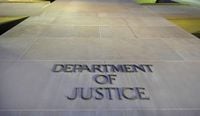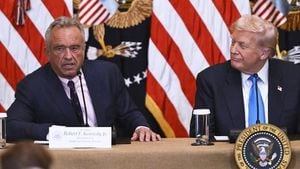In a case that has rattled national security officials and shed new light on the covert operations of North Korea, a California man was sentenced this week to eight years in federal prison after admitting to shipping weapons, ammunition, and sensitive technology to North Korea. According to statements from the U.S. Attorney’s Office in Los Angeles and the Department of Justice, Shenghua Wen, 42, orchestrated a clandestine operation over several years, funneling arms and military devices to Pyongyang in preparation for what he described as a surprise attack on South Korea.
Wen’s journey to the United States began in 2012, when he entered the country legally on a student visa from China. However, as reported by the Associated Press and corroborated by the Justice Department, Wen overstayed his visa and remained illegally in the U.S., eventually becoming entangled in a web of international intrigue and criminal activity. Court documents reveal that before arriving in America, Wen met with North Korean officials at an embassy in China, where he was instructed to procure goods for the regime—a mission that would later escalate into a full-fledged smuggling operation.
Federal prosecutors detailed how Wen’s illicit activities ramped up in 2022, when North Korean officials contacted him via an encrypted online messaging app, Wikr, directing him to acquire firearms and other military goods. According to the Justice Department, Wen communicated regularly with his North Korean handlers, who wired him approximately $2 million to facilitate the shipments. The operation was sophisticated: Wen purchased a business in 2023 called Super Armory for $150,000, registering it under his business partner’s name in Texas to avoid detection. This company, a federal firearms licensee, was used as a front to buy weapons, which were then driven across state lines and misrepresented in shipping documents as refrigerator and camera parts.
The smuggling pipeline ran from the Port of Long Beach, California, through Hong Kong, and finally to the North Korean port city of Nampo. At least three shipments were sent, including two in late 2023. Authorities noted that one of the shipments was disguised in export paperwork as a refrigerator, a ruse designed to elude customs officials. While the specific types of weapons exported were not fully detailed by investigators, an FBI complaint included a photo of an AK-47-style carbine among the items sent abroad.
Wen’s activities extended beyond firearms. North Korea reportedly tasked him with procuring civilian aircraft engines intended for use in military drones, as well as U.S. military uniforms that could be used to disguise North Korean soldiers during a planned surprise assault on South Korea. These revelations come at a time of heightened tension on the Korean Peninsula, with North Korean leader Kim Jong Un recently deploying nuclear-capable missile launchers to frontline units along the border with the South, as AP noted.
The scale of Wen’s operation became even more apparent following a search of his home in Ontario, California, in September 2024. The FBI seized 50,000 rounds of ammunition—stored in a van parked in his driveway—along with a chemical threat identification device (a Serstech Arx mkII Pharma) and a transmission detective device (an ANDRE Deluxe Near-Field Detection Receiver), both of which Wen admitted were intended for North Korean military use. A separate search uncovered a cache of 60,000 rounds of 9mm ammunition, further underscoring the volume of materiel Wen was able to amass and prepare for export.
Prosecutors asserted that Wen’s crimes posed a grave threat to the national security of both the United States and its ally, South Korea. In their sentencing memorandum, federal prosecutors stated, “Acting as an illegal operative in the United States, defendant worked to procure weapons and sensitive technology on behalf of the North Korean government.” The seriousness of the offense was not lost on U.S. District Court Judge Stephen V. Wilson, who handed down an eight-year prison sentence—surpassing the five-year term initially sought by prosecutors.
Wen’s legal troubles did not begin with arms trafficking. According to court records cited by the Justice Department, he had previously been arrested in 2021 for drug trafficking and was later convicted. He was ordered removed from the United States in 2018 for overstaying his visa, but managed to remain in the country until his arrest on weapons and illegal agent charges in November 2024. Throughout his time in the U.S., Wen used front companies and aliases to mask his activities, exploiting regulatory loopholes and relying on encrypted communications to coordinate with his North Korean contacts.
United Nations resolutions and U.S. sanctions strictly prohibit the export of weapons, ammunition, and sensitive technology to North Korea, a nation already under heavy international scrutiny for its nuclear ambitions and history of illicit arms deals. The case against Wen underscores the persistent efforts by Pyongyang to circumvent these restrictions and acquire the tools necessary for military escalation.
Authorities have not specified whether Wen organized any shipments during his first decade in the United States, but his more recent activities paint a picture of a determined and resourceful operative. The federal complaint notes that Wen went to great lengths to conceal the nature of his shipments, using intermediaries to purchase firearms and mislabeling cargo to avoid detection by customs and law enforcement. The FBI’s investigation ultimately unraveled the plot, leading to the seizure of weapons, ammunition, and military-grade detection equipment intended for North Korean use.
Wen’s case is a stark reminder of the vulnerabilities that exist within international supply chains and the ongoing challenges faced by law enforcement in tracking and intercepting illicit arms transfers. The fact that Wen was able to obtain a federal firearms license, operate front companies, and move significant quantities of ammunition and technology across state and international borders raises questions about regulatory oversight and the effectiveness of current safeguards.
Neither Wen’s attorney nor the lead prosecutor, Assistant U.S. Attorney Sarah Gerdes, responded to requests for comment following the sentencing. With Wen now behind bars, federal authorities are likely to continue probing the networks and methods used in this case, seeking to close loopholes and prevent future breaches of national security.
The episode also serves as a warning to those who might consider similar schemes. As U.S. Attorney Martin Estrada stated when announcing the charges, the government remains vigilant against threats to national security, particularly those involving hostile foreign powers and the illegal trafficking of arms and technology. For now, the court’s decisive action against Wen stands as a clear signal of the seriousness with which such offenses are treated—and the lengths to which authorities will go to protect the nation and its allies from covert threats.




